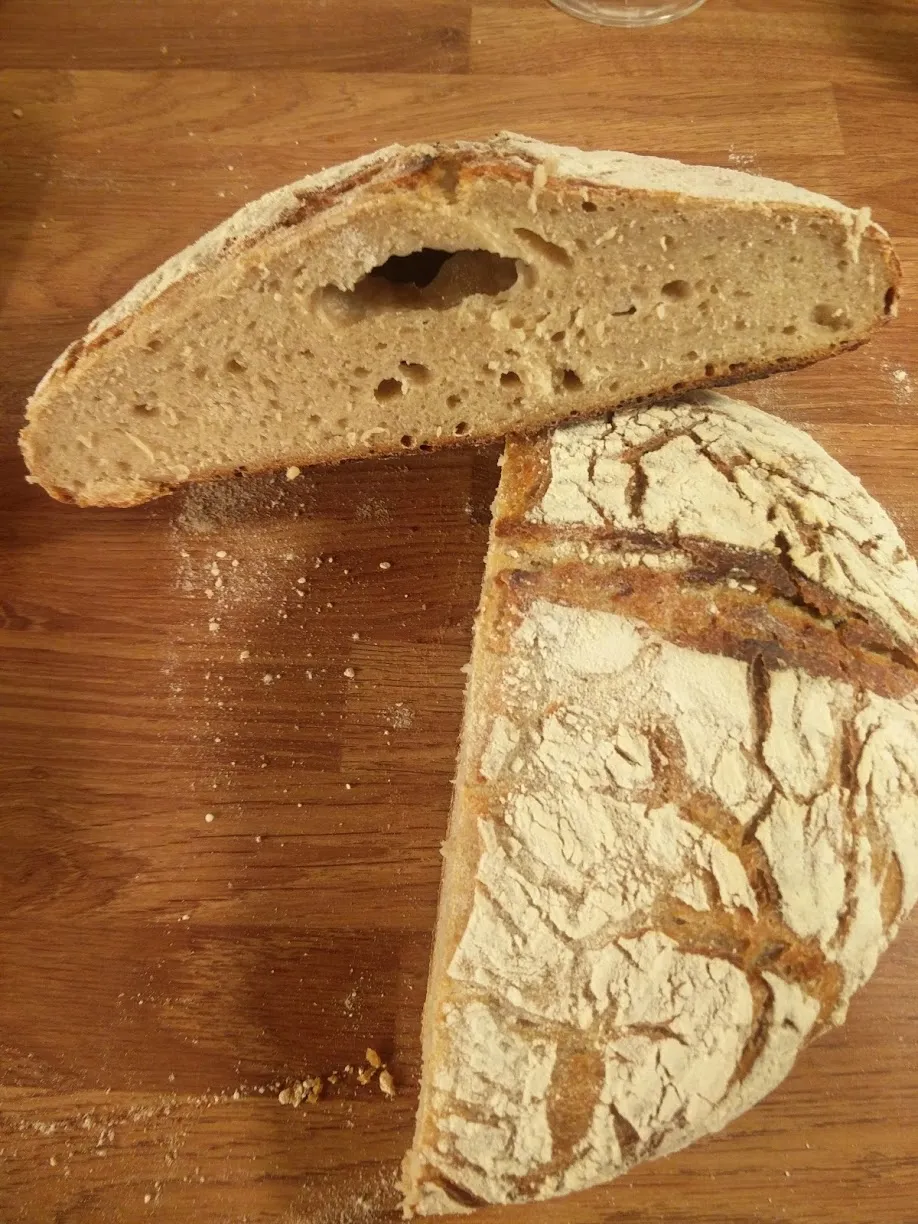
Hi!
I'm a beginner at sourdough bread-making and I am asking for help to identify what I am doing wrong. My breads generally do not rise enough and are quite compact. Yesterday I followed the steps from this video:
https://www.youtube.com/watch?v=bz38BsEEL2g&t=
In my humble opinion i followed the instructions to the letter but obviously I must have made something different as the results is not as nice as in the video. He says that the dough should rise to roughly twice the original size during proofing. This didnt happen for me, I allowed 3.5 hours for the final proofing(he states ~2 h in the video), waiting for it to rise(too long?) but it never reached this 'double size'. You can see the final result in the pic, the flavor is noticeably sour.
Do you have some suggestions for improvements based on what i wrote above and the pic? I am happy to provide more information if that helps.
I'm grateful for any input!
BR
Carburetor
I am not an expert but learnt a lot by baking together with folks on this web site on the following thread:
http://www.thefreshloaf.com/node/55230/anyone-interested-champlain-sd-bake
We are following Trevor Jay Wilson's recipe for his Champlain SD and also big fans of his book 'Open Crumb Mastery'....
A good place to start is your starter...as in my humble opinion your bread looks underfermented. and that airiness you can find in sourdough breads...in the above thread people have documented their bakes with lots of photos and you can see how the dough needs to rise and develop strenghts and those lovely signs of that fermentation. I did not look at the video in detail but I thought the guy was a bit 'rough' with the dough.....at the pre-shape stage you don't want to degas all that lovely gas (unless that is your purpose) and handle the dough gently....
So, first step in my humble opinion is whether you have enough fermentation and if not why not? This is why I suggest to have a look and get to know the rise and fall of your starter....
Secondly, don't just follow a clock...the guy in the video points out a timeline which is a great overview but as you bake regularly and often I have found that you need to be able to read the dough and NOT follow the clock...
Happy baking... Kat
Hi Kat, thanks for your feedback! I will take a look at the thread you suggested and see if I can get a better understanding.
My thought was that since the bread had a bit of a sour taste(more so than the typical sourdough flavour), maybe I had overdone one of the stages and that too much fermentation had occured at some point and the dough became too acidic? Just my speculations...
BR
Fredrik
A good place to start :)
Ok so I'm looking at the video. Good explanations so far! He talks about priming his starter and mixes it with some flour and water then leaves it for just two hours before making the dough. This is an interesting approach which sounds like making a young starter for the recipe. But this alone seems confusing as I haven't seen any of his previous videos.
For example if he has a mature and bubbly starter before "priming it" then the purpose and method makes more sense. If you follow this recipe with starter that hasn't been recently fed and fully matured then that could very well explain where you went wrong.
I'm only a few minutes in and throwing out ideas as I watch this but from what I see so far I don't think this would be a recommended beginners recipe and should be treated as a primer for sourdough learning when it comes to timing (apart from the starter), terminology and process. But not as a recipe.
I agree with Abe (I often seek his advice, lol). The priming issue seems sort of strange to me. I usually take my starter out of the fridge the day b/f I'm going to use it. just to make sure it's behaving properly and can raise my dough. Sometimes I even take it out 2 days b/f I'm going to bake and feed it 2 times the first day and then the second day proceed as per recipe. I have 2 links for you. Both are about 65% hydration and easy recipes for beginning with Sourdough.
I'd like to suggest you start either with this:
https://www.youtube.com/watch?v=WxfbiGto4R8 (Trevor J. Wilson's 65% hydration bread)
or this
http://www.wildyeastblog.com/my-new-favorite-sourdough/
Good luck.
hester
This is clearly underproofed. Dense, cakey crumb with some big holes. Try fermenting longer. This could be from underactive starter, not long enough fermentation time, or both. Another possible factor is temperature management. Too low of temperatures (for too brief a period of time) can delay fermentation. Let us know how the next bake goes.
Thanks for the comments guys, this seems like a nice community!
One question to you Filomatic, you say "Try fermenting longer", do you mean to extend the bulk fermentation in the fridge or the proofing time? Or perhaps priming the starter for longer?
Based on most of your comments it seems like the prime suspect is the starter. I agree that the case could be that my starter was not as active as his and that therefore priming it for just 2 hours was simply not enough. My plan is to feed the starter during this week and make sure it is in tiptop shape on friday and then try again this weekend, either the same recipe or the one from 'wildyeastblog' linked above, havent quite decided.
Those of you who work regular office hours-as i do- do you bake in the weekdays or is the sourdough breadmaking confined to the weekends? If so, how do you manage the timings? Bulk ferment in the fridge for ~18 hours? From midnight day 1(bedtime) to 1800 day 2(back from work)?
BR
Fredrik/Carburetor